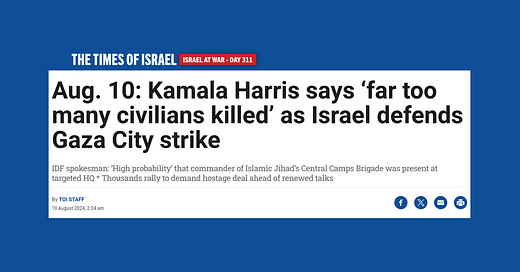Listen to a reading of this article (reading by Tim Foley):
“Far too many children have been eaten by hyenas,” the politician sobbed to the news camera while lowering more children into the hyena pit.
“Finally, a candidate who cares deeply about those poor children who keep getting killed by hyenas,” said Sally, turning up the volume on the television.
“What do you mean? She’s literally lowering those children into the hyena pit while she says that,” Phil objected.
“Okay but have you seen what the other candidate is saying?” Sally replied. “He says it’s good that the children are being eaten!”
“It’s such a sad and tragic tragedy,” the politician on TV shouted over the sound of screaming children. “We urgently need to get to the bottom of this problem.”
“Look, she just called it a tragedy,” said Sally. “The other candidate doesn’t think it’s sad or tragic at all.”
“But the end result is the same!” Phil exclaimed in exasperation. “In both cases the children are being killed, but when she kills them she’s acting sad about it!”
“She’s not killing the children, the hyenas are,” objected Sally. “Blame them!”
“Yeah but the hyenas couldn’t kill the children without her help,” Phil retorted.
“Well the hyenas have a right to eat,” said Sally. “What are you, anti-wildlife?”
“Oh my god, you ALWAYS accuse me of hating all wildlife when I object to our government’s policy of feeding children to hungry hyenas kept in a pit that was constructed for that specific purpose!”
“Okay well then if you’re not anti-wildlife I don’t understand why you’re so fixated on this one specific issue, Phil. There are other issues like reproductive rights, fiscal policy, and immigration reform you could be focusing on, but all you want to talk about is this small pit of hyenas which our government officials happen to lower a cage full of children into every morning.”
“Well maybe I don’t feel comfortable supporting anyone who’s going to feed children to hyenas at all, regardless of what words they happen to be saying about it and what emotions they happen to be expressing while doing so.”
“Look, she’s just making hard choices within the framework of the political realities of our day. If she stopped feeding children to the hyenas altogether, the hyena lobby would never let her become president.”
“Well then maybe that’s the problem, Sally! Maybe the problem is that we have a system that only lets us choose between politicians who want to feed children to hyenas! Maybe we should be fighting the fact that powerful interest groups exert so much control over our electoral and governmental systems that they can force the advancement of extremely depraved agendas with no accountability to the electorate, instead of fighting over which child killer we should be electing to lower children into the hyena pit!”
“What I’m hearing is that you want the guy who doesn’t say compassionate things about dying children to win, AND you also hate wildlife.”
“I’m turning off the TV, Sally.”
_____________________
If you’d prefer to listen to audio of these articles, you can subscribe to them on Spotify, Apple Podcasts, Soundcloud or YouTube. My work is entirely reader-supported, so if you enjoyed this piece here are some options where you can toss some money into my tip jar if you want to. Go here to find video versions of my articles. Go here to buy paperback editions of my writings from month to month. All my work is free to bootleg and use in any way, shape or form; republish it, translate it, use it on merchandise; whatever you want. The best way to make sure you see the stuff I publish is to subscribe to the mailing list on Substack, which will get you an email notification for everything I publish. All works co-authored with my husband Tim Foley.
Bitcoin donations: 1Ac7PCQXoQoLA9Sh8fhAgiU3PHA2EX5Zm2






As usual Caitlin nails it. I'm saving this to send to friends and family who keep throwing the 'but trump' at me for supporting Jill Stein. Maybe this piece will show them how ridiculous they look to me. Thanks!
Alice, Tweedledum and Tweedledee all engage in a moral discussion about the poem after it has been recited. Alice springs upon its most obvious and simple moral conclusion by saying that she “like[s] the Walrus best” because “he was a little sorry for the oysters” (Carroll, pg.141). Tweedledee challenges this assertion by revealing that “he ate more than the Carpenter” (Carroll, pg.141). When this changes Alice’s mind, his brother points out that the Carpenter “ate as many as he could get” (Carroll, pg.141). They are then forced to come to the conclusion that both the Carpenter and the Walrus are “very unpleasant characters” (Carroll, pg.141).